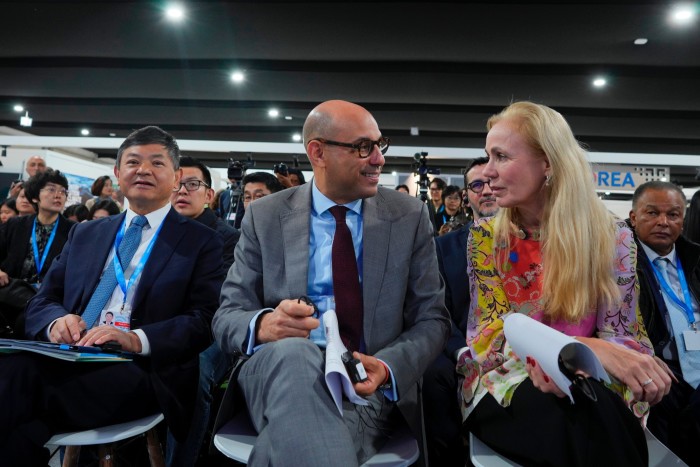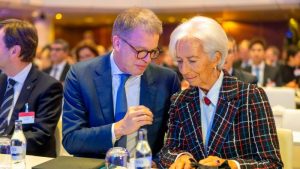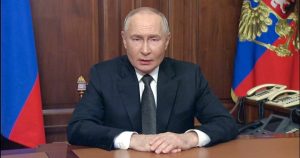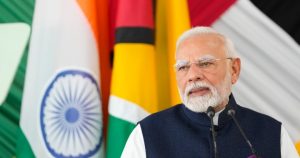Ministers land in Baku to help break finance stalemate at COP29

Unlock the Editor’s Digest for free
Roula Khalaf, Editor of the FT, selects her favourite stories in this weekly newsletter.
Ministers involved in leading UN COP29 negotiations from countries including Germany to Australia and South Africa have landed in Baku in a bid to break an impasse over a new global finance deal in the final week of the climate summit.
While some top diplomats, such as US climate official John Podesta and Brazil’s Marina Silva and André Corrêa do Lago, had flown to Brazil to push for support for climate action at the G20 leaders meeting in Rio, the ministers in Azerbaijan were girded for a battle to keep talks on track at COP29.
Donald Trump’s election and the aggressive stance of the host country president Ilham Aliyev cast a shadow over COP29 in its first week, leaving the key business of raising money to help deal with climate change in disarray at the halfway point.
Talks to agree a new finance goal floundered on Saturday, ahead of a scheduled one-day pause on Sunday.
Efforts to include in the final agreement the steps forward for the transition away from fossil fuels and the shift to greener energy by 2050, which was agreed with caveats at the last COP28 in Dubai, also stalled.
On the key finance discussions, rich countries have baulked at demands from developing countries for a target of at least $1tn, replacing an existing $100bn goal agreed a decade ago. A continued push for China, Saudi Arabia and the UAE to contribute has been staunchly resisted.
One G7 country negotiator said the finance discussions were “blocked” on the weekend, and there was a need for “champions” to “come out of the woodwork to improve things”.
At the same time, the group of Arab countries and the “like-minded” developing countries bloc, a negotiation group that includes nations from Bolivia to Kuwait, pushed back on the discussions to shift away from fossil fuels.
President Aliyev has described oil and gas as a “gift from god”, and the industry is heavily represented at COP29 by executives and lobbyists with guests including more than half a dozen bosses of large oil and gas producers.
A group of business associations and climate leaders issued an open letter to G20 heads of state, meeting in Rio de Janeiro over the next two days, saying that “international businesses are concerned about the lack of progress and focus in Baku”.
“The G20 must energise COP29 negotiations,” said María Mendiluce, chief executive of the We Mean Business Coalition.
Climate and energy ministers expected to meet in Baku over the coming days include Germany’s Annalena Baerbock, Netherlands’ Sophie Hermans, Gilberto Pichetto Fratin from Italy, Dion George from South Africa and India’s Kirti Vardhan Singh.
The UK’s Ed Miliband and Brazil’s Silva, both veterans of difficult UN climate summits, are also expected to return, after departing temporarily since attending the COP29 opening a week ago.
One of the ministers charged with overseeing the finance talks, Australia’s minister for climate change and energy Chris Bowen, arrived on Saturday to launch his own $125mn finance initiative for the Pacific Islands. But he said it remained to be seen how the wider finance negotiations would unfold.
Singapore’s environment minister Grace Fu, who is co-leading on carbon markets talks, will arrive on Monday, and fellow co-lead, New Zealand’s climate change minister Simon Watts, is expected to join her.
Many ministers from vulnerable island states were already in Baku, including Yusuf Mkungula, secretary for natural resources and climate change in Malawi, and Cedric Schuster of Samoa.

UN climate boss Simon Stiell said the G20 summit “must send crystal clear global signals” that more grant and concessional finance would be available.
“Here in Baku negotiators are working around the clock on a new climate finance goal. There is a long way to go, but everyone is very aware of the stakes, at the halfway point in the COP.”
A report published during the summit from the Independent High-Level Expert Group outlined a goal to raise $1tn a year in international finance for developing markets, excluding China, by 2030. About half would come from the private sector.
A further $250bn would come from multilateral development banks, and the remainder from various sources, including bilateral grants, so-called innovative sources of finance such as new levies on shipping, carbon markets and philanthropy, the group said.
On Sunday in Rio, President Joe Biden said the US had lifted its climate finance to $11bn annually by 2024 from $1.5bn in fiscal 2021, confirming a commitment to do so. This included $3bn for poorer countries to adapt to climate change consequences.
Western countries said the UN report was a helpful reference point for future finance needed to be agreed at COP29, but Michai Roberston, a negotiator for the Alliance of Small Island States said that poorer countries needed more grant financing.
Climate Capital

Where climate change meets business, markets and politics. Explore the FT’s coverage here.
Are you curious about the FT’s environmental sustainability commitments? Find out more about our science-based targets here
#Ministers #land #Baku #break #finance #stalemate #COP29




